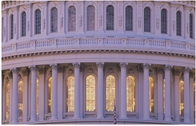Advertisement
ICBA Testifies Before Congress to Remain Secondary Market Players

The Independent Community Bankers of America (ICBA) testified before Congress on the need to ensure community banks continue to have robust access to the secondary mortgage market. Testifying before the Senate Banking Committee’s Subcommittee on Securities, Insurance and Investment, ICBA Vice Chairman Jack Hartings said provisions in the recently introduced Housing Finance Reform and Taxpayer Protection Act (S. 1217) would help provide secondary market access to community banks without requiring them to take on the additional risk and cost of securitizing loans.
“An aggressive role for the government in housing is no longer a viable option,” said Hartings, who is also president of the Peoples Bank Co. in Coldwater, Ohio. “Community banks are prepared to adapt and thrive in this environment. But whatever replaces the secondary market system must have features to allow community banks to continue to thrive as mortgage lenders and to serve their communities.”
Community banks represent approximately 20 percent of the mortgage market, with their mortgage lending often concentrated in the small towns and rural areas that are not effectively served by large financial institutions, Hartings noted. As high-quality mortgage underwriters, community banks help stabilize and support the secondary market. Continued access to the secondary market will help them continue to lend, minimize risk and provide stability to the mortgage market.
ICBA supports provisions of S. 1217 that would support community bank access to the secondary market, including those to:
►Establish a mutual securitization company to allow small originators to sell loans for cash and to retain servicing rights,
►Continue to authorize the Federal Home Loans Banks to issue mortgage-backed securities,
►Limit issuers to no more than 15 percent of outstanding guaranteed securities to reduce concentration in the securitization market, and
►Establish a Federal Mortgage Insurance Corp. guarantee to ensure the securitization market continues to function in times of market stress.
Hartings noted that the worst outcome in reforming the housing-finance government-sponsored enterprises (GSEs) would be to allow a small number of the largest financial firms to mimic the size and scale of Fannie Mae and Freddie Mac under the pretense of creating less risk in a private-sector solution.
About the author





